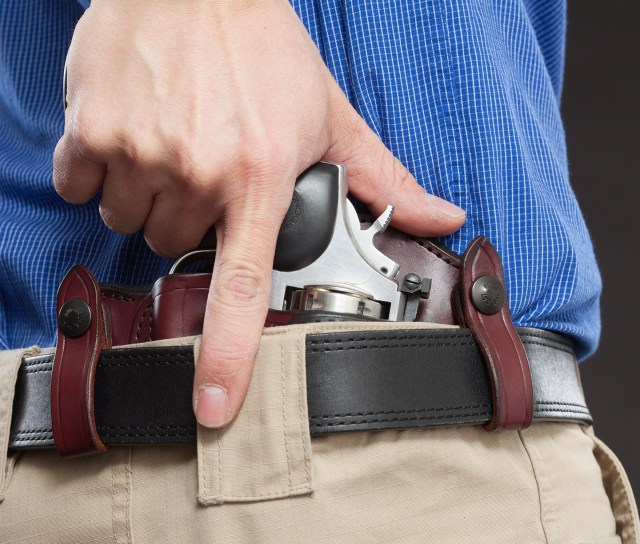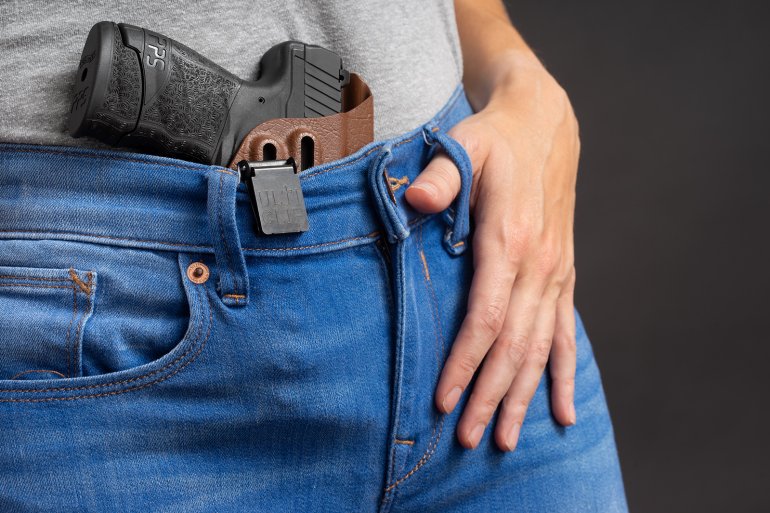
Photos by Oleg Volk. Used with permission.
Story by John Boch
With Chinese virus worries across America, a lot of folks new to concealed carry have decided to carry a gun for a change. Some have owned guns for years and some just bought their first firearm. Depending on who’s counting, there are 16, 17 or 18 constitutional carry states in the country where no permit is required to tote a concealed handgun legally.
While carrying a gun provides a very effective and capable tool against attack, it also carries some risk if used inappropriately. If you’re new to carry, read this. It may keep you out of jail.
I’ve carried for a couple of decades now and I’ve taught concealed carry and plenty more firearms classes over the years, too. At the same time, I have pursued my own learning and have enough course completion certificates to wallpaper my man cave. That includes a number of courses that included detailed legal considerations.
This isn’t about “What I’m Carrying Now.” These are tips to keep you out of trouble with the law and put your mind at ease about carrying that heater of yours.
Avoidance
As you navigate through life, you probably know from common sense that you can’t claim self-defense if you started or escalated a conflict. You can claim self-defense after flipping someone off and things go south over a trivial perceived slight, but you better have a really good lawyer and very deep pockets.
There aren’t likely to be any concealed carriers on a potential jury. Neither will there be, in all likelihood, any of your fellow gun club members or TTAG readers.
Instead, you may have one or more people who outright dislike guns and have a dim view of those who carry them. You may even have people who don’t believe in self-defense at all.
In most parts of America, the majority of any jury pool will likely have “agnostic” views on guns and self-defense. They will take a skeptical view of someone who uses deadly force against another people.
What’s more, the “victim” (the person you shot) may show up for your trial…or the the criminal’s family if you killed the person you shot. Those family members can influence the jury. That’s one reason why prosecutors encourage family members to attend the trial.
All of which is why it’s best to steer clear of trouble to begin with.
Mind your own business. Use your situational awareness to identify potential trouble, then practice avoidance where possible. Use the words “I’m sorry” freely and smile. Both can help deescalate a tense moment.
Don’t hesitate to say “I don’t want any trouble” as necessary where “I’m sorry” fails to smooth things over.
For those living in states with “stand your ground” (SYG) laws, beware. SYG is not a hunting license to take out a-holes and criminals.
While you can “stand your ground” in the face of a threat of death or grievous bodily harm in those states, retreating before shooting will always look better to witnesses, investigating officers, prosecutors, judges and most importantly, juries.

Self-Defense is for Innocent People, Not Property
Can you use force to defend your property? As a rule, no.
Most of us have a little terrier dog inside us. If someone’s taking your stuff, it’s difficult not to try to intercede to stop a thief. But pulling a gun to stop a theft or even a forcible felony involving theft isn’t justifiable under the law in most states (know your local laws).
And even if you don’t intend to introduce a firearm into the mix to stop a theft in progress, things may escalate.
The better, more prudent course of action is to call the police and offer a good description. Don’t shoot a thief with anything other than a (smart phone) camera. And don’t block their escape (see the previous paragraph about escalating a situation).
Now there may be extenuating circumstances that merit the use of deadly force to stop what looks like a theft to some. For instance, I can’t shoot someone for getting into my idling car at a gas station and driving away.
However, if my newborn boys are napping in their car seats as I fuel my idling car, that’s another story. If a miscreant hops in under those circumstances and tries to drive off, I’d smoke him rapidly and promiscuously. I would have used deadly force not to stop a car theft, but to stop a child abduction/kidnapping.
An attempted arson of an occupied dwelling is one very common exception to the “don’t use force to defend property” maxim. But then, the force is used to thwart the arson to protect people inside, not the structure or the property.
Keep your hands off of it
New carry holders oftentimes will touch their gun to reassure themselves that all is well with that hunk of plastic and metal on their hip. Criminals often do the same, but for different reasons (primarily because most criminals carry without a holster).
Wear your gun in a good, comfortable holster on a stiff belt and…leave it alone.
You may think that everyone can see subtle signs of your gun under your clothing, but worry not. At least 99.44% of people don’t pay attention. That last half-percent or so will not typically visually frisk you unless you give them a reason to do so.
I carried a big gun in a fashion-disaster fanny pack in plain sight for a bunch of years and precious few people knew I had a gun on my hip.
I’ll admit to the first time a young cop stood behind me in line at a fast food joint cause a tiny bit of pucker for me. In the end, though, he didn’t notice my sloppily concealed gun under my dirty t-shirt. Or if he did, he simply didn’t care.
If you choose to carry in non-permissive environments (that would be at work for most folks), deep concealment is the word. In other words, make sure people can’t see the outline of your gun through your clothes. Keep your mouth shut about your carry habits and nobody will know unless you need to deploy it in an emergency.
Protect Yourself Legally
Lastly, if you carry a gun for personal defense, make sure you protect your financial well-being. Buy some carry insurance. Three companies I like are Armed Citizens Legal Defense Network, US Law Shield and US Concealed Carry Association.
None of them pay me or GSL to mention them. However, if you mention my name or Guns Save Life, Armed Citizens Legal Defense Network will knock $25 off your first year’s membership and treat you like part of the family. Meanwhile, US Law Shield will waive the sign up fee and give you an extra two months of coverage if you mention your membership in GSL. If they won’t honor this at their corporate number, email or call me and I’ll put you in touch with one of their people who can do just this.
And US Concealed Carry Association, the people who offer truly comprehensive coverage, if you call their group sales line, they will give you 15% off as a GSL member.
I recommend these three because I’ve studied a lot of these companies and see these three as among the very best. What’s more, all three will begin to pay for your legal defense for self-defense even before an arrest. Years ago, most companies would pay a reimbursement of legal fees incurred only after an acquittal.
Armed Citizens and US Law Shield are both about $130-ish per year. I belong to both. Armed Citizens can recommend an attorney or you can utilize your own. Meanwhile US Law Shield generally requires you to use their contract attorney.
US Law Shield, like US Concealed Carry, covers legal representation in “red flag” hearings. These legal proceeding can happen in states with these laws when someone thinks you’re a danger to yourself or others. A judge temporarily strips you of your gun rights without a hearing and you have to attend a hearing a couple of weeks later to prove your competence to regain your right to keep and bear arms.
And while none of us expects to find ourselves on the receiving end of one of these confiscation orders, knowing you’re covered is priceless for your peace of mind.
In addition to red flag coverage, US Concealed Carry offers truly comprehensive coverage. But it comes at a higher price.
Think you don’t need legal defense financial protection? Even something as trivial as using pepper spray in self-defense to avoid using lethal force can result in tens of thousands of dollars in legal bills.
You’re in Good Company
Remember, when you carry your gun for self-defense each day, you join millions of other law-abiding good guys and gals who do the same. Use common sense and practice situational awareness and avoidance and you’ll keep yourself and your family safe and protected. Especially in times like these.

